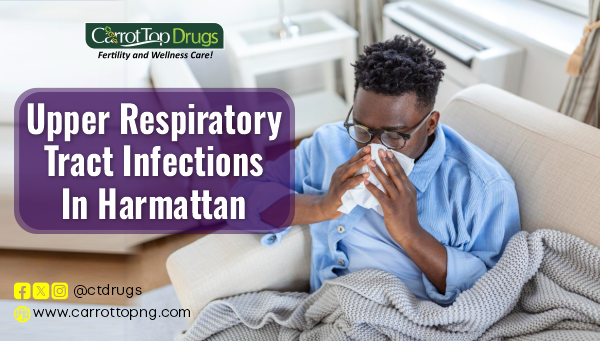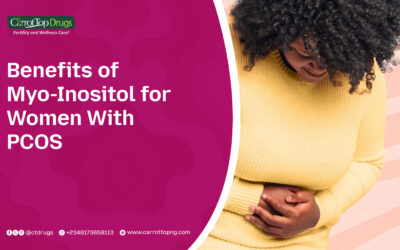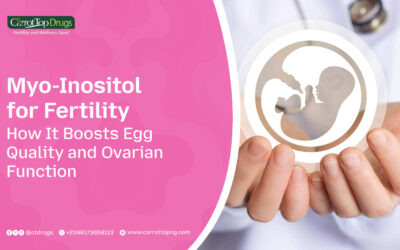Introduction
The arrival of Harmattan in Nigeria brings with it a myriad of challenges, one of the most notable being an increased prevalence of upper respiratory tract infections (URTIs). As the dry and dusty winds sweep across the country, individuals are more susceptible to various respiratory ailments. In this article, we intend to shed more light on the common upper respiratory tract infections in harmattan.
Definitions and Examples of Common Upper Respiratory Tract Infections During Harmattan
URTI stands for Upper Respiratory Tract Infection. It refers to infections that affect the upper respiratory system, including the nose, throat, sinuses, and sometimes the ears. URTIs are commonly caused by viruses, such as the rhinovirus (which causes the common cold) or influenza virus, but can also be caused by bacteria. These infections often present with symptoms like nasal congestion, sore throat, coughing, sneezing, and sometimes fever.
URTIs are typically mild and self-limiting, but in some cases, they can lead to complications such as sinusitis or pneumonia, especially in vulnerable populations such as the elderly or those with weakened immune systems. Treatment usually focuses on relieving symptoms and may include rest, hydration, over-the-counter medications, and in some cases, antibiotics if a bacterial infection is present.
Incidence of Upper Respiratory Tract Infections in Harmattan Season in Nigeria
There is an increased incidence of upper respiratory tract infections in harmattan in Nigeria. The dry and dusty air, coupled with increased indoor crowding due to cooler temperatures, creates an environment conducive to the spread of respiratory viruses. As a result, healthcare facilities witness a surge in cases related to URTIs during this period.
According to a research conducted by Akinyemi Gabriel Omonijo et al., there was an increased level of upper respiratory tract infection in harmattan in children less than 10 years with figures of 60% in Ile Ife and 48% in Ilorin between 1996 and 2006. The statistics from the research revealed an increase in the upper respiratory tract infections in harmattan.
Reasons Why Upper Respiratory Tract Infections Are More Rampant During Harmattan Season
Several factors contribute to the heightened prevalence of URTIs during the Harmattan season. Here are some of the common reasons why upper respiratory tract infections are more rampant during the harmattan season.
1. Airborne Particulate Matter:
The Harmattan season, notorious for its dry and dusty conditions, witnesses a surge in airborne particulate matter comprising dust, pollen, and other pollutants. These particles not only irritate the upper respiratory tract, escalating the risk of upper respiratory tract infections in Harmattan, but also act as carriers for viruses and bacteria, thereby facilitating their transmission from person to person.
2. Reduced Immune Function:
Prolonged exposure to the dry and dusty atmosphere prevalent during Harmattan can detrimentally impact the immune system. The respiratory epithelium, crucial in defending against pathogens, may weaken, rendering individuals more susceptible to upper respiratory tract infections in Harmattan. Additionally, the environmental stressors of Harmattan further compromise the immune response, exacerbating the predisposition to URTIs.
3. Environmental Pollution:
Harmattan coincides with elevated levels of air pollution stemming from anthropogenic sources like vehicle emissions, industrial activities, and biomass burning, in addition to natural particulate matter. Exposure to these pollutants exacerbates respiratory inflammation, impairs lung function, and compromises the body’s defense mechanisms, thereby amplifying the prevalence of upper respiratory tract infections during Harmattan.
4. Indoor Air Quality:
To combat the cold, individuals often resort to indoor heating systems during Harmattan, inadvertently compromising indoor air quality. Heating systems reliant on fossil fuels or biomass combustion emit pollutants such as carbon monoxide, volatile organic compounds (VOCs), and particulate matter, heightening the risk of upper respiratory tract infections among occupants, particularly during the Harmattan season.
5. Preexisting Respiratory Conditions:
Individuals with preexisting respiratory conditions, including asthma, chronic obstructive pulmonary disease (COPD), or allergic rhinitis, face exacerbated symptoms during Harmattan. The dry and dusty air characteristic of this season triggers respiratory exacerbations, augmenting susceptibility to upper respiratory tract infections in Harmattan. Furthermore, underlying respiratory conditions may compromise lung function, impeding the body’s ability to mount an effective immune response against infections.
6. Suboptimal Hygiene Practices:
The environmental challenges posed by Harmattan may disrupt regular hygiene practices, such as handwashing and personal hygiene, further exacerbating the risk of upper respiratory tract infections in Harmattan. Dry and cracked skin, prevalent during this season, may serve as entry points for pathogens, while reduced access to clean water and sanitation facilities can hinder efforts to maintain proper hygiene, amplifying the transmission of URTIs.
Signs and Symptoms of Upper Respiratory Tract Infections
Upper respiratory tract infections (URTIs) during the Harmattan season often manifest with a range of signs and symptoms that are similar to those experienced during other times of the year. Understanding these symptoms is crucial for timely identification and management of URTIs. Below are the details of common signs and symptoms associated with URTIs during the Harmattan season:
1. Nasal Congestion:
One of the hallmark symptoms of URTIs is nasal congestion or a stuffy nose. This occurs when the nasal passages become inflamed and swollen due to viral or bacterial infection. Nasal congestion can make breathing difficult and may be accompanied by a runny nose or postnasal drip.
2. Sore Throat:
URTIs can cause irritation and inflammation of the throat, leading to a sore or scratchy throat. This discomfort may worsen when swallowing or talking and can range from mild to severe depending on the severity of the infection.
3. Coughing:
Coughing is a common symptom of URTIs and serves as the body’s natural mechanism to clear the airways of mucus and irritants. The cough may be dry or productive, producing phlegm or mucus. It can be persistent and may worsen at night or with physical activity.
4. Sneezing:
Sneezing is another common symptom of URTIs, especially when the nasal passages are irritated or inflamed. It is the body’s reflexive response to expel irritants or infectious agents from the nasal passages. Sneezing may occur frequently and is often accompanied by nasal congestion and a runny nose.
5. Fever (in some cases):
While not always present, fever can occur in some cases of URTIs, particularly if the infection is caused by a bacterial pathogen. Fever is the body’s response to infection and is characterized by an elevated body temperature above the normal range (typically above 100.4°F or 38°C). Fevers associated with URTIs during Harmattan may be low-grade but can vary in intensity.
6. Fatigue:
URTIs can cause fatigue or a feeling of tiredness, which is often attributed to the body’s immune response to fighting off the infection. Fatigue may be accompanied by a general sense of malaise or weakness and can interfere with daily activities and productivity.
7. Headache:
Headaches are a common symptom associated with URTIs, often resulting from sinus congestion, inflammation, or pressure buildup. The headache may be mild to moderate in intensity and may worsen with coughing or sneezing.
Diagnosis of Upper Respiratory Tract Infections
Diagnosing upper respiratory tract infections (URTIs) involves a combination of clinical assessment, patient history, and sometimes laboratory tests. Here’s a detailed explanation of the diagnosis process for URTIs:
1. Medical History:
The healthcare provider begins by taking a thorough medical history, including details about the onset and duration of symptoms, recent exposure to sick individuals, travel history, and any underlying medical conditions that may predispose the patient to respiratory infections.
2. Physical Examination:
A comprehensive physical examination is conducted to assess vital signs, examine the nose, throat, and lungs for signs of inflammation or infection, and evaluate lymph nodes for swelling. The presence of characteristic symptoms such as nasal congestion, sore throat, coughing, and sneezing helps guide the diagnosis.
Diagnostic Tests:
3. Throat Swab Culture:
In cases where bacterial infection is suspected, a throat swab may be collected and sent for culture to identify the specific bacteria causing the infection. This helps guide antibiotic therapy.
4. Rapid Antigen Tests:
Rapid antigen tests for influenza may be performed to quickly identify the presence of influenza viruses. These tests provide rapid results within minutes, allowing for timely initiation of antiviral treatment if necessary.
5. Complete Blood Count (CBC):
A CBC may be ordered to assess for signs of infection, such as elevated white blood cell count (leukocytosis) or presence of inflammatory markers like C-reactive protein (CRP) or erythrocyte sedimentation rate (ESR).
6. Chest X-ray:
In cases where there are symptoms suggestive of lower respiratory tract involvement or complications such as pneumonia, a chest X-ray may be ordered to evaluate the lungs for signs of inflammation or consolidation.
Treatment of Upper Respiratory Tract Infections
The treatment of upper respiratory tract infections (URTIs) aims to relieve symptoms, shorten the duration of illness, prevent complications, and minimize the spread of infection. Here’s a detailed explanation of the treatment options for URTIs:
Symptomatic Relief:
Pain Relievers:
Over-the-counter pain relievers such as acetaminophen (Tylenol) or nonsteroidal anti-inflammatory drugs (NSAIDs) like ibuprofen (Advil, Motrin) can help reduce fever, relieve sore throat, and alleviate headaches associated with URTIs.
Decongestants:
Oral or nasal decongestants can help alleviate nasal congestion by shrinking swollen nasal passages and reducing mucus production. However, decongestants should be used with caution and for short durations to avoid rebound congestion and other side effects.
Cough Suppressants:
Cough suppressants such as dextromethorphan or codeine-containing medications may be used to suppress dry, non-productive coughs. Expectorants like guaifenesin can help loosen and thin mucus, making it easier to expel through coughing.
Antihistamines:
Antihistamines may be used to alleviate symptoms of allergic rhinitis or reduce sneezing and runny nose associated with URTIs. However, they may cause drowsiness and should be used with caution, especially in children and older adults.
Hydration and Rest:
Adequate hydration and rest are essential components of URTI treatment. Drinking plenty of fluids helps thin mucus secretions, soothe a sore throat, and prevent dehydration. Resting allows the body to conserve energy and focus on fighting off the infection.
Antibiotics (in selective cases):
Antibiotics are not routinely recommended for the treatment of URTIs, as the majority are caused by viral pathogens against which antibiotics are ineffective. However, antibiotics may be prescribed in specific cases:
Bacterial Infections:
If a bacterial infection, such as streptococcal pharyngitis (strep throat), is suspected based on clinical evaluation or diagnostic tests, antibiotics such as penicillin or amoxicillin may be prescribed to eradicate the bacterial pathogen.
Humidification:
Using a humidifier or steam inhalation can help alleviate nasal congestion, soothe irritated mucous membranes, and loosen mucus secretions, making it easier to breathe and promoting faster recovery.
Antiviral Medications (for influenza):
In cases of influenza (flu), antiviral medications such as oseltamivir (Tamiflu) or zanamivir (Relenza) may be prescribed if started within the first 48 hours of symptom onset. These medications can help reduce the severity and duration of flu symptoms and may be recommended for certain high-risk individuals or those with severe illness.
Home Remedies:
Several home remedies may provide symptomatic relief for URTIs, including:
- Gargling with warm salt water to soothe a sore throat.
- Using saline nasal sprays or saline nasal irrigation (e.g., neti pot) to moisturize nasal passages and clear mucus.
- Drinking warm beverages such as herbal tea with honey and lemon to soothe a sore throat and provide hydration.
Preventive Measures against Upper Respiratory Tract Infections During Harmattan Season in Nigeria
Preventing upper respiratory tract infections (URTIs) during the Harmattan season in Nigeria involves implementing various strategies to reduce exposure to pathogens and strengthen the body’s immune system. Here are some preventive measures:
Hand Hygiene:
Practice frequent handwashing with soap and water for at least 20 seconds, especially after coughing, sneezing, or touching surfaces. Use alcohol-based hand sanitizers if soap and water are not available.
Respiratory Etiquette:
Cover your mouth and nose with a tissue or your elbow when coughing or sneezing to prevent the spread of respiratory droplets. Dispose of used tissues properly and wash your hands immediately afterward.
Avoid Close Contact:
Minimize close contact with individuals who are sick or showing symptoms of respiratory infections. Maintain a safe distance, especially in crowded or enclosed spaces.
Stay Home When Sick:
If you develop symptoms of a respiratory infection, such as fever, cough, or sore throat, stay home from work, school, or other public gatherings to prevent spreading the illness to others.
Boost Immune System:
Support your immune system by eating a balanced diet, staying physically active, getting enough sleep, and managing stress. We recommend taking Evergreen Immune Max to boost your immune system against upper respiratory tract infections which are rampant during harmattan. It contains a blend of Vitamin C, Vitamin D3, Zinc oxide and some herbs like ginger, sambucus elderberry which are known for their immune-boosting effect.
Stay Hydrated:
Drink plenty of fluids, such as water, herbal teas, and clear broths, to stay hydrated and maintain optimal mucous membrane function.
Use Humidifiers:
Use humidifiers or vaporizers to add moisture to indoor air and prevent dryness of the respiratory mucous membranes.
Avoid Smoking:
Avoid smoking and exposure to secondhand smoke, as it can weaken the immune system and increase the risk of respiratory infections.
Vaccination:
Get vaccinated against influenza annually to reduce the risk of flu-related complications. Vaccination against other respiratory pathogens may also be recommended.
Environmental Precautions:
Take precautions to minimize exposure to environmental factors that can exacerbate respiratory symptoms, such as dust, pollution, and indoor allergens.
Conclusion
The Harmattan season in Nigeria poses significant challenges in terms of increased prevalence of upper respiratory tract infections. Understanding the common infections, their symptoms, diagnosis, treatment, and preventive measures is essential for minimizing their impact on public health. By adopting preventive measures and seeking timely medical attention, individuals can reduce the risk of URTIs and promote overall well-being during the Harmattan season.
FAQs
Q. Can URTIs be completely prevented during the Harmattan season?
A. While it may not be possible to completely prevent URTIs, implementing preventive measures can significantly reduce the risk of infection.
Q. Are there any specific dietary recommendations to prevent URTIs during Harmattan?
A. Eating a balanced diet rich in vitamins and minerals can support the immune system and help prevent URTIs. Include plenty of fruits, vegetables, whole grains, and lean proteins in your diet.
Q. Is it necessary to wear a face mask during Harmattan to prevent URTIs?
A. While face masks can help reduce the spread of respiratory infections, their effectiveness may vary. It’s essential to focus on other preventive measures such as hand hygiene, respiratory etiquette, and avoiding close contact with sick individuals.

















